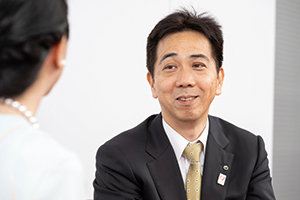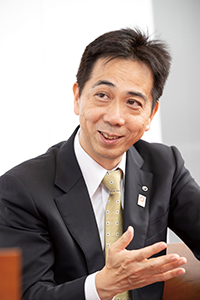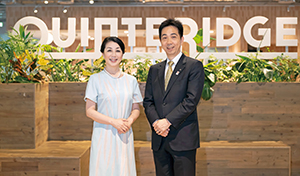 |
|
|
|
|
|
View from the Top Vol. 21, No. 8, pp. 1–5, Aug. 2023. https://doi.org/10.53829/ntr202308tp1
If You Are Determined, You Can Achieve Anything—Take on New Challenges While Strengthening Existing BusinessesAbstractNTT WEST continues to take on challenges together with its stakeholders to create an exciting future by using information and communication technology. The company has redefined the “NTT WEST Spirit” and designated the company purpose in pursuit of a future in which all people are happy and prosperous. We interviewed Akira Shirahase, senior vice president and executive manager of the Technology and Innovation Department, NTT WEST, about his technology strategy and his mindset as a top executive. Keywords: open innovation, purpose, QUINTBRIDGE Re-defining “NTT WEST Spirit” at a major inflection point—Could you tell us the status of NTT WEST’s business? Amid declining revenue mainly due to the decrease in the number of fixed-telephone subscribers, NTT WEST is going through a period of transformation to shift its revenue structure to that focused on businesses in growth areas. To remain a useful partner with regional communities and transform ourselves into a company that can grow even more, we are accelerating our transformation into a leaner organization capable of responding quickly to changes in the environment by reviewing our working practices while boosting our business in growth areas to more than 50% of our revenue by 2025. In 2021, we set a new purpose, “‘Connecting’ then ‘opening’ the door to the new world. As a member of regional communities, we will continue to pursue a vision of a future in which all people are happy and prosperous. To that end, we will refine our technology and wisdom and take on the challenge of co-creating new value.” To achieve this purpose, all employees are taking ownership of their work. —It is important to take ownership over everything. What are you doing to achieve the company’s purpose? In addition to encouraging employees to link their purpose to that of the company’s, we have set up dialogue meetings in each department to exchange opinions and provide opportunities to talk with top management. I also participate in such meetings and listen to the discussions. I receive reports from managers on a daily basis, so I find the time I spend meeting face-to-face with non-managerial employees, talking with them at length, and listening to them very enjoyable and fulfilling. Naturally, some of the opinions expressed in those meetings have been harsh, but such candid exchanges have given me valuable insights. Today is said to be the age of VUCA (volatility, uncertainty, complexity, and ambiguity), in which we are faced with complex and diverse social issues. In this age of diversity, it is important to learn about each other’s different values and ways of thinking through such direct communication, and as a venue for this learning, these dialogue meetings are very meaningful. I believe that proactive action based on a mutual understanding of different values is truly taking ownership of work. In the process of achieving our purpose, we will primarily focus on local regions, but, at the same time, we see the potential to expand our business not only locally but also globally. Specifically, we are expanding new businesses that have been successful in Japan to overseas markets. For example, “Comic C’moA,” a manga and e-book distribution service provided by NTT Solmare, an NTT WEST Group company, has 35 million monthly users. Recognizing that Japanese manga culture has taken root overseas, we launched “Manga Plaza,” an e-book distribution service for North America in March 2022 and are strengthening our international business. I believe that other businesses originating from Japan, such as local food-waste recycling solutions that invigorate local economy, robots for labor saving, and artificial-intelligence solutions, have great potential. Conversely, we want to actively collaborate with overseas ventures in providing competitive services in Japan.
In addition to technology, it is important to anticipate the market—So you are conducting business not only on a regional basis but also with a view to global expansion. As a chief technology officer, can you tell us about the technology strategy and vision that is key to achieving the purpose? In the field of information and communication technology (ICT), we are focused on multi-cloud, network-integrated ICT infrastructure, and managed services. Regarding problem solving, we are focused on municipal digital transformation, education, and healthcare. Regarding creating the future, we intend to create services in areas of lifestyle, health, economy, and the environment to build a future society of well-being. In consideration of these areas, our technology strategy and vision has two axes: (i) transforming ourselves into an innovative company for solving social problems and (ii) providing telecommunications services as a critical infrastructure that supports the digital society. Specifically, we will create new businesses that have a positive impact on society through open innovation and the early use of Innovative Optical and Wireless Network (IOWN) technologies to create and expand services in priority growth areas and develop technologies for the stable operation, high efficiency, and advancement of network infrastructure as a social infrastructure. For example, we are considering a service that provides customers with prompt and easy-to-understand information on service quality and infrastructure status by visualizing such pieces of information so that customers can use telecommunications services with peace of mind and we can respond more quickly when problems occur. Toward the era of IOWN, we will also promote the migration to the next network. Current network systems, which have been adapted to change over time, are inherently complex and inefficient partly because they have responded to each milestone of change step by step. I therefore believe that next-generation network operation systems and architectures must be investigated. With an eye on Web 3.0 and other digital technologies, we must also investigate a new network architecture that uses IOWN-related technologies. We hope to introduce some of those technologies and architectures at Expo 2025 Osaka, Kansai, Japan. Incidentally, QUINTBRIDGE, the venue for this interview, is an open innovation facility established in March 2022 as a place to solve social problems and create a future society together with partners such as companies, including start-ups, local governments, and universities. People of various nationalities, genders, and ages from all walks of life have visited the facility where many discussions and events have been held. NTT WEST’s open innovation takes place right here. We will also actively use our relationships with global partners to achieve open and network-related innovation. —The spacious open spaces and private rooms are very modern in design and almost make you feel like being in a café. And discussions are going on even at the coffee stand, which stimulates creativity just by looking at it. In today’s complex, diverse, and changing environment, the ability to anticipate the market is important in addition to technological capability. I believe the key to how to anticipate the market is open innovation. After all, social and technological trends cannot be noticed by the activities of a single company. We cannot anticipate the market without understanding such trends in a timely manner through meetings, conversations, and discussions with people from various walks of life about the trends in society and technology. I believe it is critical to make new discoveries through these endeavors. QUINTBRIDGE has been used by a total of 92,000 people since it opened. It has hosted over 470 events in one year and three months. I consider the open innovation approach at QUINTBRIDGE to be an innovation in itself. Normally, open-innovation facilities operated by operating companies attract people who want to work with those companies; in contrast, at QUINTBRIDGE, which does not solely focus on matching people with NTT WEST, each member first brings their questions and challenges as well as assets that can be provided to the venue, which will lead to the opportunity of opening the door for co-creation activities for solving social problems with other members, including NTT WEST. Therefore, QUINTBRIDGE has brought together more partners than anticipated and created many lively activities as we see today. I feel it difficult for many Japanese companies, especially large ones, to push the envelope on their own. Therefore, I want to create a process that allows companies to push themselves beyond their limits. By providing this process, I believe that NTT WEST can become a next-generation social enterprise by expanding and supporting each company. One mechanism to achieve this is QUINTBRIDGE. I can feel the expectations its participants have toward us from the daily activities at QUINTBRIDGE. Since the establishment of QUINTBRIDGE more than one year ago, we have established the foundation for open innovation; however, we need to further clarify what we need to do to create new business and fully use QUINTBRIDGE as a training ground to maximize our achievements. In addition, I feel that member companies, including start-ups, are hoping to collaborate with the NTT Group as a whole. We therefore intend to serve as a hub for collaboration between member companies and NTT Group companies and create business that has a positive impact on society by leveraging the NTT Group’s combined capabilities as well as take on challenges that can demonstrate the strength of NTT WEST.
Top management are the ones who change things and decide matters, but we must not be self-righteous—Can you share with us some of the lessons you have learned since joining NTT? I joined NTT in 1992 and engaged in corporate sales, two years after which I was transferred to the Los Angeles office of NTT America. While working to support the global expansion of our corporate customers based in western Japan, I witnessed the rapid commercialization of the Internet in the U.S. I suggested to executives that “The Internet could be good business.” and became involved in Internet connection services with the support of NTT’s research laboratory there. Through this experience, I reaffirmed that NTT is a company that takes suggestions positively and has a treasure trove of human resources including its laboratories. It was my experience at the APEC Osaka Conference (1995)—where I was assigned to a project to promote Internet-related businesses after returning to Japan—which made me realize how important human relationships are. To support Internet connection for the conference, manufacturers, broadcasters, advertising agencies, and other companies and universities were assembled. Together with these organizations, we then launched “Cyber Kansai,” a joint industry-government-academia consortium that promotes the development and demonstration of advanced Internet technologies. Led by members of Cyber Kansai, new companies, such as NTT SmartConnect, and new services, such as radiko—a service that enables users to listen to the radio via smartphone, were established. I feel how rewarding these experiences are and how they could contribute to society. I want to create a new legacy at the Expo 2025. Perhaps the lesson drawn from these experiences is that diversity is important. It takes “awareness” to actively embrace diversity because people can only see what they want to see. I also learned the importance of balancing between new and existing businesses. In corporate activities, we tend to be drawn to deepening/strengthening existing businesses rather than exploring new businesses. Sometimes we cannot afford to create a new business because we focus too much on operating an existing business. However, random attempts to search for a new business will not work. I value this balance and rebalancing in decision-making on the basis of market needs and knowledge. —What do you do to improve the quality of your decision-making? To improve the quality of my decision-making, I value interacting with people from various positions inside and outside the company. Until recently, due to the COVID-19 pandemic, it was not possible to interact directly with people, and that situation made me realize the value of such interaction. I believe that if you are determined, you can achieve anything. Through my past experiences, I have come to realize that making a choice first is a powerful tool for achieving something, no matter how long it takes. I also believe that top management are “the people who decide and make changes.” The final decision is the responsibility of top management, but it is not a self-righteous decision. I make decisions by listening to understand different situations and positions, considering outlooks, and making sure that I’m guiding employees in the right direction. It is difficult for people to change, especially stop, the direction in which they are moving in what they believe to be the best way. That is why top management have the responsibility of making decisions. It is also difficult for companies to initiate change on their own. That is where open innovation—which I mentioned earlier—becomes important. Because change can be created through co-creation with a variety of people. —Finally, what is your message to us all? First, to all our researchers, NTT Group’s strength is its ongoing commitment to research and development, including basic research. I want you to take on the challenge of creating new technologies, but do so with an assumption of how the technology might be valuable. It is OK if the technology you developed turns out to be used in areas that differ from your original purpose. I urge you to create new value with confidence. Next, to our engineers and technicians, to transform into an innovative company solving social problems while protecting the telecommunications infrastructure, we must simultaneously work on both deepening/strengthening existing businesses and exploring new businesses. We need both people who do new things and people who maintain things; therefore, I want us to foster a culture of mutual respect and mutual help. I also want to create a community that connects the group’s human resources horizontally while using QUINTBRIDGE, so I urge you to join or plan to create such communities. Last but not least, to our customers and partners, we would like to create and share various business ideas with you by hosting events at QUINTBRIDGE and the upcoming 2025 Expo as platforms. Let us create new ideas and services to build a better society.
Interviewee profileCareer highlightsAkira Shirahase joined NTT in 1992. He became a member of the board, NTT SmartConnect, in 2014, president and representative member of the board, NTT SmartConnect, in 2016, and member of the board and executive manager of the Business Design Department, NTT WEST, in 2020. He has been in his current position since June 2021. |
|












